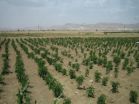(Press-News.org) More efficient use of the food production chain and a decrease in the amount of food losses will dramatically help maintaining the planet's natural resources and improve people's lives. Researchers in Aalto University, Finland, have proved a valid estimation, for the first time, for how many people could be fed with reducing food losses. The world's population is an estimated seven billion people. An additional one billion can be fed from our current resources, if the food losses could be halved. This can be achieved if the lowest loss percentage achieved in any region could be reached globally.
- There isn't enough clean water everywhere on Earth. Significantly more agricultural land cannot be cleared as well as certain raw material minerals for fertilizers are running low. At the same time, a quarter of the amount of calories in produced food is lost or wasted at different stages of food production chain, which results in unnecessary resources loss, says Matti Kummu, post-doctoral researcher at Aalto University in Finland.
The new study is the first to evaluate the impact of food losses and its relationship to resources on a global scale. Annually 27 m3 of clean water, 0.031 hectares of agricultural land and 4.3 kilos of fertilizers per every inhabitant in the world is wasted in food losses.
- Agriculture uses over 90 percent of the fresh water consumed by humans and most of the raw materials used in fertilizers. More efficient food production and the reduction of food losses are very important matters for the environment as well as future food security, Kummu adds.
Further, for the first time, the global food losses in terms of kilocalories per person were estimated.
As a result of food loss in the food production chain, it was determined that globally 614 kilocalories per every person a day are lost. Without this loss, present global food production would yield 2,609 kilocalories of edible food a day for every inhabitant in the world. Thus, by halving the food losses, we could feed 8 billion people with the currently used resources.
INFORMATION:
This study was published in Science of the Total Environment. The researchers of VU University Amsterdam and the University of Bonn also participated in the research. In addition to Aalto University, the research was also funded by Maa- ja vesitekniikan tuki ry, IWT Flanders and NWO, the Netherlands Organization for Scientific Research.
Aalto University, Finland is a new multidisciplinary science and art community in the fields of science, economics, and art and design. The University is founded on Finnish strengths, and its goal is to develop as a unique entity to become one of the world's top universities. Aalto University's cornerstones are its strengths in education and research. At the new University, there are 20,000 basic degree and graduate students as well as a staff of 5,000 of which 350 are professors.
Halving food losses would feed an additional billion people
2012-10-10
ELSE PRESS RELEASES FROM THIS DATE:
Return to Bremerhaven
2012-10-10
Polarstern is expected back from the Central Arctic expedition "IceArc" in Bremerhaven on 8 October 2012 after a good two months. 54 scientists and technicians from twelve different countries conducted research on the retreat of the sea ice and the consequences for the Arctic Ocean and its ecosystems over a period of two months in the High North. A number of new technologies were used for to film and photograph life in and below the ice down to a depth of 4400 metres. Since its departure from Tromsø (Norway) on 2 August 2012 Polarstern has travelled some 12,000 kilometres ...
Sitting on top of the world
2012-10-10
Do you have it in mind to go to a mountain top and study beetles that nobody else has ever seen? Well, there are two fewer such mountains available now that beetle species discovered on Mont Tohiea and Mont Mauru in the Society Islands have been named. James Liebherr, Curator of the Cornell University Insect Collection, has just described 14 species of predatory carabid beetle, also called ground beetles, as part of a U.S. National Science Foundation team that surveyed the insects and spiders of French Polynesia.
Liebherr described the species in two papers published ...
Study: Parenting more important than schools to academic achievement
2012-10-10
New research from North Carolina State University, Brigham Young University and the University of California, Irvine finds that parental involvement is a more significant factor in a child's academic performance than the qualities of the school itself.
"Our study shows that parents need to be aware of how important they are, and invest time in their children – checking homework, attending school events and letting kids know school is important," says Dr. Toby Parcel, a professor of sociology at NC State and co-author of a paper on the work. "That's where the payoff is."
The ...
Are liberal arts colleges disappearing?
2012-10-10
EAST LANSING, Mich. — Liberal arts colleges continue redefining their historical missions or flat-out disappearing – a trend that threatens to diminish America's renowned higher education system, argues a study co-authored by a Michigan State University scholar.
Of the 212 liberal arts colleges identified in a landmark 1990 study, only 130 remain in their traditional form – a 39 percent reduction, according to the new research.
While some liberal arts schools have closed or become part of larger universities due to financial problems, Roger Baldwin, MSU professor of ...
A tactile glove provides subtle guidance to objects in the vicinity
2012-10-10
Researchers at HIIT and Max Planck Institute for Informatics show how computer vision -based hand tracking and vibration feedback on the user's hand can be used to steer the user's hand toward an object of interest. A study shows an almost three-fold advantage in finding objects from complex visual scenes, such as library or supermarket shelves.
Finding an object from a complex real-world scene is a common yet time-consuming and frustrating chore. What makes this task complex is that humans' pattern recognition capability reduces to a serial one-by-one search when the ...
Angel investor market in steady recovery, UNH Center for Venture Research finds
2012-10-10
DURHAM, N.H. – The angel investor market in the first two quarters of 2012 showed signs of steady recovery since the correction in the second half of 2008 and the first half of 2009, with total investments at $9.2 billion, an increase of 3.1 percent over the same period in 2011, according to the Center for Venture Research at the University of New Hampshire.
A total of 27,280 entrepreneurial ventures received angel funding during the first half of 2012, a 3.7 percent increase from the same period in 2011, and the number of active investors in Q1 and Q2 2012 was 131,145 ...
Biologists describe details of new mechanism for molecular interactions
2012-10-10
UPTON, NY-Scientists at the U.S. Department of Energy's (DOE) Brookhaven National Laboratory, with collaborators from Harvard University, the University of Madrid, Princeton University, and the University of Zurich, have discovered a new mechanism that may alter principle understandings of molecular interactions within a cell's nucleus. The discovery illustrates how two proteins of the human adenovirus use DNA as an efficient form of transportation inside a newly synthesized virus particle. The proteins use what the scientists are calling a "molecular sled," which slides ...
From lectures to explosives detection: Laser pointer identifies dangerous chemicals in real-time
2012-10-10
WASHINGTON, Oct. 9, 2012—By using an ordinary green laser pointer, the kind commonly found in offices and college lecture halls, an Israeli research team has developed a new and highly portable Raman spectrometer that can detect extremely minute traces of hazardous chemicals in real time. The new sensor's compact design makes it an excellent candidate for rapid field deployment to disaster zones and areas with security concerns. The researchers will present their findings at Laser Science XXVIII—the American Physical Society Division of Laser Science's Annual Meeting—collocated ...
Satiation hormone could increase risk of diabetes, heart attack and breast cancer in women
2012-10-10
The findings have been presented in a study from Lund University in Sweden, published in the Journal of the American Medical Association.
"It was surprising to find such a clear link to the risk of type 2 diabetes and cardiovascular disease as well as to breast cancer. Obesity is a common risk factor for all three conditions, but the connection with neurotensin is not explained by obesity or other known risk factors", says Professor Olle Melander from the Department of Clinical Sciences at Lund University, who is also a consultant at Skåne University Hospital.
"This ...
UAB researchers develop an advanced computer simulator to manage hospital emergencies
2012-10-10
Researchers of the group High Performance Computing for Efficient Applications and Simulation (HPC4EAS) of the Department of Computer Architecture and Operating Systems of the Universitat Autònoma de Barcelona (UAB), in collaboration with the team at the Emergency Services Unit at Hospital de Sabadell (Parc Taulí Healthcare Corporation), have developed an advanced computer simulator to help in decision-making processes (DSS, or decision support system) which could aid emergency service units in their operations management.
The model was designed based on real data provided ...



